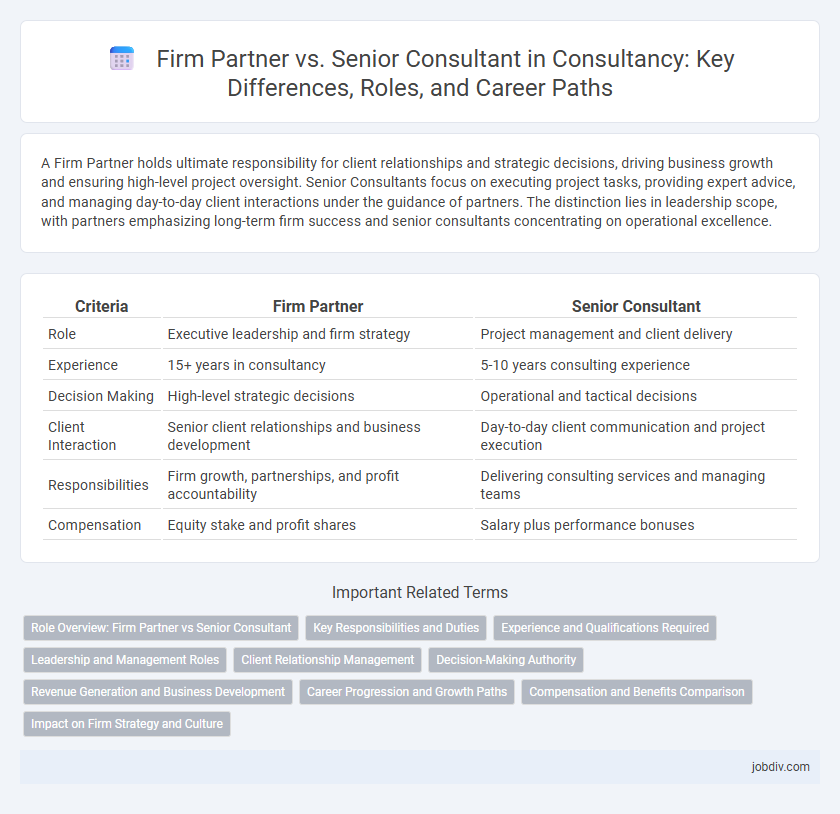A Firm Partner holds ultimate responsibility for client relationships and strategic decisions, driving business growth and ensuring high-level project oversight. Senior Consultants focus on executing project tasks, providing expert advice, and managing day-to-day client interactions under the guidance of partners. The distinction lies in leadership scope, with partners emphasizing long-term firm success and senior consultants concentrating on operational excellence.
Table of Comparison
| Criteria | Firm Partner | Senior Consultant |
|---|---|---|
| Role | Executive leadership and firm strategy | Project management and client delivery |
| Experience | 15+ years in consultancy | 5-10 years consulting experience |
| Decision Making | High-level strategic decisions | Operational and tactical decisions |
| Client Interaction | Senior client relationships and business development | Day-to-day client communication and project execution |
| Responsibilities | Firm growth, partnerships, and profit accountability | Delivering consulting services and managing teams |
| Compensation | Equity stake and profit shares | Salary plus performance bonuses |
Role Overview: Firm Partner vs Senior Consultant
Firm Partners lead strategic decision-making, manage client relationships, and drive business growth, overseeing multiple projects and mentoring senior staff. Senior Consultants focus on delivering project-specific solutions, performing in-depth analysis, and supporting client engagements with specialized expertise. The Partner role emphasizes leadership and firm direction, while the Senior Consultant prioritizes technical execution and client service.
Key Responsibilities and Duties
Firm Partners oversee strategic decision-making, business development, and client relationship management, ensuring long-term firm growth and profitability. Senior Consultants lead project delivery, conduct in-depth data analysis, and provide actionable recommendations to clients, focusing on operational improvements. Both roles require strong leadership and industry expertise, but Partners emphasize external engagement while Senior Consultants concentrate on project execution.
Experience and Qualifications Required
Firm partners typically possess over 10 years of industry experience, advanced academic qualifications such as MBAs or specialized certifications, and a proven track record in business development and client management. Senior consultants usually require 5 to 7 years of relevant experience, strong analytical skills, and professional certifications like PMP or Lean Six Sigma to execute complex projects effectively. Both roles demand deep sector knowledge, but partners emphasize strategic leadership while senior consultants focus on technical expertise and project delivery.
Leadership and Management Roles
Firm Partners hold strategic leadership roles, overseeing business development, client relationships, and firm-wide decision-making. Senior Consultants primarily manage project teams, ensuring effective execution, client engagement, and delivery excellence on specific assignments. Leadership at the Partner level emphasizes long-term vision and firm profitability, while Senior Consultants focus on operational management and team mentorship within projects.
Client Relationship Management
A Firm Partner holds ultimate responsibility for strategic client relationship management, leveraging extensive industry networks to secure long-term engagements and business growth. Senior Consultants manage daily client interactions, ensuring project deliverables align with client expectations and fostering trust through consistent communication. The Partner's role emphasizes high-level negotiation and client retention, while Senior Consultants focus on operational execution and relationship nurturing.
Decision-Making Authority
A Firm Partner holds significant decision-making authority, overseeing strategic directions, client engagements, and resource allocations within the consultancy. Senior Consultants typically execute analyses and provide recommendations but have limited authority in final decisions or policy setting. The Firm Partner's role involves approving project scopes and budgets, whereas Senior Consultants focus more on implementation and technical contributions.
Revenue Generation and Business Development
Firm Partners drive significant revenue generation through strategic client acquisition and long-term relationship management, often securing multi-million dollar contracts. Senior Consultants focus on delivering project value and supporting business development by identifying client needs and proposing tailored solutions, contributing to revenue growth indirectly. The partnership role demands robust networking and negotiation skills to expand the firm's market presence, while Senior Consultants build credibility through technical expertise and client satisfaction.
Career Progression and Growth Paths
Firm Partners hold equity stakes and steer overall business strategy, offering long-term career stability and leadership opportunities, while Senior Consultants focus on managing project delivery and client relationships, building expertise for advancement. Career progression from Senior Consultant to Partner typically requires demonstrated impact in revenue generation, client development, and strategic influence. Growth paths emphasize expanding leadership skills, industry specialization, and business acumen to transition from operational roles to executive decision-making positions.
Compensation and Benefits Comparison
Firm Partners typically receive significantly higher total compensation than Senior Consultants, including base salary, profit sharing, and performance bonuses reflecting equity stakes in the firm. Senior Consultants earn competitive salaries with structured bonuses and benefits packages, but lack the long-term wealth accumulation potential associated with partnership equity. Benefits for Partners often include enhanced retirement plans, greater expense allowances, and decision-making privileges that influence firm profitability and compensation structures.
Impact on Firm Strategy and Culture
Firm Partners shape long-term strategy through stakeholder engagement and drive firm culture by modeling leadership values. Senior Consultants influence project-level outcomes and team dynamics, fostering innovation and operational efficiency. Partners' decisions have broader organizational impact, while Senior Consultants contribute to tactical execution and cultural reinforcement.
Firm Partner vs Senior Consultant Infographic

 jobdiv.com
jobdiv.com